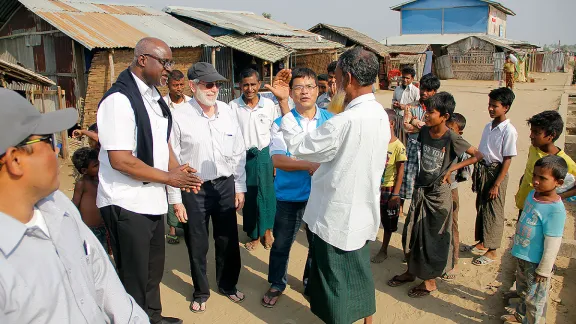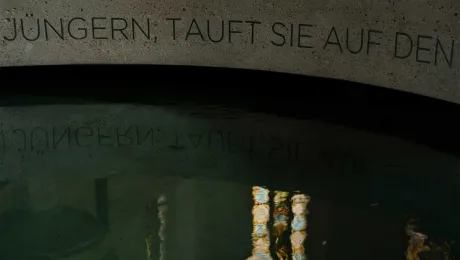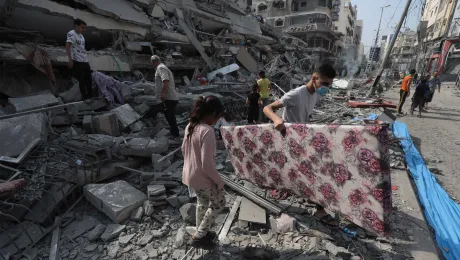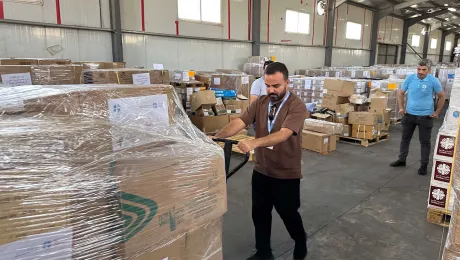
The LWF president discusses with residents of Ohn Taw Gyi (South) camp. Photos: LWF/ I. Htun
“Courage, commitment and hard work for the people we serve”
(LWI) - On his recent visit to Myanmar, The Lutheran World Federation (LWF) President Archbishop Dr. Panti Filibus Musa visited two camps for internally displaced people, the Ohn Taw Gyi (South) camp and the Min Gan camp situated near the Rakhine capital of Sittwe.
Following inter-communal conflict in June, 2012, about 145,000 people from both Rakhine Buddhist and Muslim communities were displaced. Many of them are still living in camps for internally displaced people (IDP) in Sittwe, Pauktaw and other townships across Rakhine state. Ohn Taw Gyi (South) is a camp for the displaced Muslim community. It is home to 44,617 people, of which 11,728 receive assistance from the LWF.
Challenging environment
The LWF president observed the living situation of the displaced people and listened to concerns of the communities, the way issues are being solved in the camp and the host community, and the communication between camp management committee and community. “I encourage all people of Myanmar to work together to enjoy lasting peace”, he said.

Women’s group meeting in one of the camps for internally displaced people in Myanmar.
Daw Halimah, leader of the women’s group in the camp, outlined some of the challenges of life in the camps: “When someone gets sick, it is difficult to access medical treatment in time, because we cannot leave the camp due to security restrictions.” She also stressed the need for better infrastructure for the children accessing higher education. “We need to have a paved road, especially in the rainy season. Right now the children risk having accidents on their way to school.”
Commitment and hard work
On his visit to the field operation in Rakhine state, the LWF president commended the local LWF staff for their work in a challenging context. “I salute your courage, commitment and hard work in continuing to serve the people of Myanmar despite the challenges,” the LWF president said.
I want to thank you all for the work you are doing in order to support the community and people in need. You represent our LWF values with your commitment to peace, justice, reconciliation and the desire to work together to promote human dignity.
“I want to thank you all for the work you are doing in order to support the community and people in need. You represent our LWF values with your commitment to peace, justice, reconciliation and the desire to work together to promote human dignity,” he added.
Embracing diversity
In recent years, LWF staff have been targeted by the ethnic violence in Rakhine state themselves. On numerous occasions, activities were suspended and staff security was at risk. Despite these incidents and pressure from their communities, the multi-ethnic local team in Myanmar has continued to serve the people in need.

The LWF President visits one of the informal schools run by the LWF in an IDP camp in Myanmar.
LWF Myanmar Livelihoods Coordinator, Myo Thia Kyaw, said on this issue, “I am a Buddhist, but I would like to represent Muslims, Christians and any other religion as well, meaning that we value and respect the rights of every religion in Myanmar. I want the international community and everyone else to see Myanmar as one community in which people empower each other.”
The LWF president appreciated the example LWF staff had set in Myanmar “This is a good example of unity and diversity, which is needed not only in Myanmar, but all over the world.” He encouraged colleagues to “continue to work together with the Lutheran churches and never give up even in the most challenging of situations.

LWF staff, in the field office in SITTWE, group photo with the LWF President Archbishop Dr. Panti Filibus Musa, during his visit to Myanmar in January 2018. Almost all the employees are from local communities.
LWF began working in Myanmar in response to cyclone Nargis in 2008. In 2012, long-standing ethno-political-resource tensions between the Buddhist Rakhine and the Muslim population turned into violence leading to displacement of the affected population. LWF then expanded operations to the camps of displaced populations of both communities shortly thereafter. Today, LWF World Service has offices in Rakhine, Chin, Kayin and Delta states. The biggest operation in Rakhine state provides education and development support to those in need in both the Muslim and Rakhine communities where rights and access to quality social services remain a challenge.
More stories


